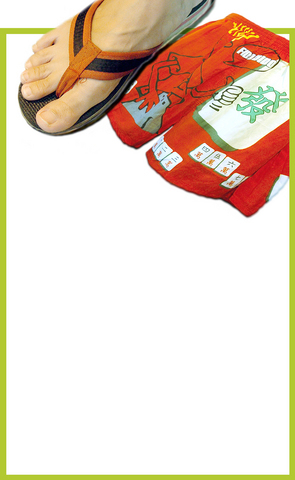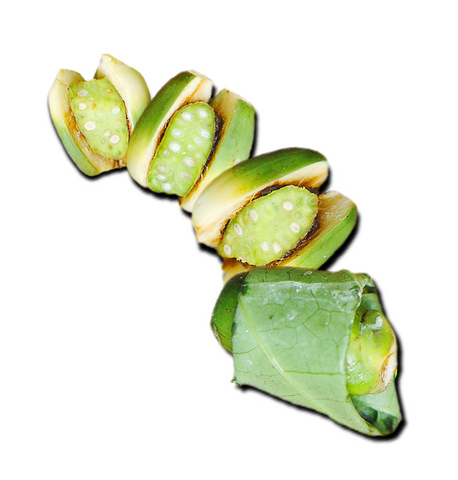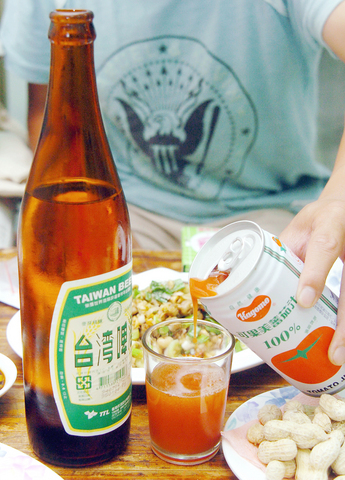A woman walks into a 7-Eleven wearing plastic slippers, jeans under a short skirt, an "Abibas" shirt and her motorcycle helmet. She purchases a bottle of rice wine, several cans of Vitali, and a pack of Long Life cigarettes, gets on the back of a scooter already occupied by three family members and rides away.
Though this scenario is an imagined one, it's no stretch of the imagination. It is a stereotypical look at the habits of a few Taiwanese people's habits and behavior. This was sometimes encapsulated by the term taike (
But while the slight hasn't completely lost its sting, it has been soothed by the surging popularity of Taiwanese culture. "Taike" has entered the lexicon of cool.

PHOTOS: CHANG CHIA-MING, TAIPEI TIMES
In their current issue, the editors of Eslite Reader (
It claims taike as a term is not anti-Taiwanese, but instead can be embraced as an integral part of local culture and another aspect of bentuhua (
"Some people have told us that if we talk about it, we're still making fun of it," said Sophie Chiang (

It wasn't always thus. When the KMT supporters first arrived in the country they were often ostracized by locals who felt oppressed by the government that had taken charge of the island. The KMT supporters, many of them soldiers, were seen by Taiwanese as tang shan zi (
To the new arrivals, locals became taike, literally "Taiwanese guests." This was the sociopolitical pressure cooker that would simmer and occasionally come to boil over the next decades, alleviated by the end of martial law nearly 20 years ago and democratization.
To what degree time has tempered those ill feelings depends on who you ask, but it has certainly altered the semantics of the situation. For today's generation of young people in particular taike is more likely to be used playfully, rather than used as an insult.

It has even been co-opted by some who embrace the stereotypes. Wu Peng-feng (
"It depends on who's talking and how they say it," he said. "If it's a young person, they probably don't mean it as an insult. But if it's an older person, it could be impolite. It depends on their tone."
Like others interviewed for this article, Wu shied away from offering a description of the term, saying instead that one simply knows it when one sees it.
Examples that were offered by others included: The cup wedged between the seats of a cab for the driver to spit betel nut; watermelon dipped in soy sauce and wasabi; the ubiquitous sausage-seller; hometown rock hero Wu Bai's (
Chiang said their decision to write about "new taike", as they call it, was based in part on the many Web sites that discuss the stereotypes.
"Some [of the Web sites] say it's discriminatory and other say it's still a little bit insulting," she said. "But at the same time there are celebrities who imitate taike." Rather than making fun, she said, they're emulating attributes they find cool.
Advertising, too, has targeted the stereotypes to sell everything from energy drinks to banking services.
"Taike is being released from its stereotypes and becoming a lifestyle term," Chiang said. "To embrace it, you maybe accept a more liberal lifestyle or you are bolder or braver. ... It's about the power of naming and identity," she said, and the fact that we control what words mean.
Still, there are places where plastic slippers aren't seen as a fashion statement. Signs outside nightclubs often proscribe chewing betel nut or blowing whistles and warn that anyone wearing slippers will be refused entry.
Chiang prefers to see the current debate in a broader context. Despite Taiwan's 400 years of history, she said, colonization and political upheaval have made for interesting times.
"Everything has happened here very quickly," she said. "The essence of being Taiwanese is change. Taike, too, is changing in context."
△ Look for the Taike Rock and Roll Concert (台客搖滾演唱會) to take place on Aug. 19 and Aug. 20 at the Taipei International Convention Center, with headliners Wu Bai and China Blue, MC Hotdog, Zhang Zhen-yue (
△ For more information on tickets and what it means to be taike, visit http://www.bcc.com.tw/all_net/news/tsong/tsong.htm.

The 2018 nine-in-one local elections were a wild ride that no one saw coming. Entering that year, the Chinese Nationalist Party (KMT) was demoralized and in disarray — and fearing an existential crisis. By the end of the year, the party was riding high and swept most of the country in a landslide, including toppling the Democratic Progressive Party (DPP) in their Kaohsiung stronghold. Could something like that happen again on the DPP side in this year’s nine-in-one elections? The short answer is not exactly; the conditions were very specific. However, it does illustrate how swiftly every assumption early in an

Francis William White, an Englishman who late in the 1860s served as Commissioner of the Imperial Customs Service in Tainan, published the tale of a jaunt he took one winter in 1868: A visit to the interior of south Formosa (1870). White’s journey took him into the mountains, where he mused on the difficult terrain and the ease with which his little group could be ambushed in the crags and dense vegetation. At one point he stays at the house of a local near a stream on the border of indigenous territory: “Their matchlocks, which were kept in excellent order,

Jan. 19 to Jan. 25 In 1933, an all-star team of musicians and lyricists began shaping a new sound. The person who brought them together was Chen Chun-yu (陳君玉), head of Columbia Records’ arts department. Tasked with creating Taiwanese “pop music,” they released hit after hit that year, with Chen contributing lyrics to several of the songs himself. Many figures from that group, including composer Teng Yu-hsien (鄧雨賢), vocalist Chun-chun (純純, Sun-sun in Taiwanese) and lyricist Lee Lin-chiu (李臨秋) remain well-known today, particularly for the famous classic Longing for the Spring Breeze (望春風). Chen, however, is not a name

There is no question that Tyrannosaurus rex got big. In fact, this fearsome dinosaur may have been Earth’s most massive land predator of all time. But the question of how quickly T. rex achieved its maximum size has been a matter of debate. A new study examining bone tissue microstructure in the leg bones of 17 fossil specimens concludes that Tyrannosaurus took about 40 years to reach its maximum size of roughly 8 tons, some 15 years more than previously estimated. As part of the study, the researchers identified previously unknown growth marks in these bones that could be seen only